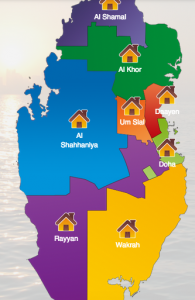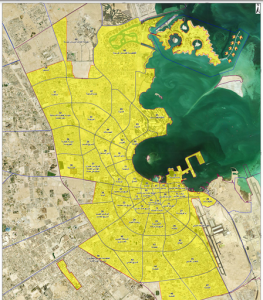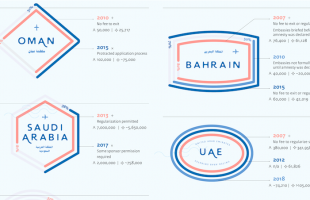In yet another move that marginalises lower-income migrant workers, Qatar’s Ministry of Municipal and Urban Planning has released a map earmarking ‘no-go’ zones for workers (erroneously dubbing these men as bachelors, though most of them leave behind wives and children, to earn a living in the Gulf state.) Areas marked yellow in each municipality in this map are the 'family' zones.
These designated areas are out of bounds for labor ‘camps’ – the commonly used, derogatory term that refers to workers’ accommodation. Not half as derogatory as the actual accommodations themselves, which are ill-equipped, overcrowded and unhygienic, hidden away from the glitz of city lights.
Lower-income workers are often prevented from entering malls on weekends, and last year, were not even allowed to attend the National Day parade, a public event.
This map further strengthens the narrative of the ‘other’, and the need to exclude to maintain national identity and culture – ideas wielded to justify the restriction of migrant worker’s rights and dehumanise them.
[tweetable]Qatar is showing more resourcefulness and commitment to marginalising workers than it does to providing them basic human rights.[/tweetable]
According to local news site Doha News, this is not a new regulation.
“While the so-called “bachelor ban” is not new, following legislation that was introduced in 2010, this appears to be the first time the government has released detailed maps highlighting family-only zones.”
While tens of thousands of migrant workers are housed in remote areas outside of town, a good number fashion shared accommodation out of old houses in the residential parts of town.
For some workers, when a company does not provide accommodation, or deducts a large proportion of their salary for rent, they seek alternatives. This might be shared rooms or bed space in the city, or as Migrant-Rights.org has reported, workers may become homeless.
Gulf Migrant Rights Researcher for Amnesty International, Mustafa Qadri says,“On its face the plans to regulate migrant worker housing is a good thing. Thousands of workers suffer in poorly constructed and maintained informal housing which are a health and fire risk, not to mention an added indignity for people doing difficult jobs far from their loved ones."
“But the current legal regime, ostensibly prohibiting worker accommodation in designated "family areas", has often lead to the forced and arbitrary eviction of migrant workers and is highly discriminatory,” he says.
“Proper regulation of housing requires urgent attention in Qatar, but instead of seeking to apply discriminatory laws and policies behind the No Go Zones, the authorities should be cracking down on employers who house migrant workers in dirty, cramped and dangerous accommodation,” Qadri says.
Qatar is a signatory to the International Convention on the Elimination of Racial Discrimination (though it does not recognise the competence of the the Committee).
As a signatory, the government of Qatar is under an obligation to ensure that there is no racial discrimination in housing and to ensure to all persons equality before the law, Qadri states.
“The Committee on the Elimination of Racial Discrimination has stated that ‘Under the Convention, differential treatment based on citizenship or immigration status will constitute discrimination if the criteria for such differentiation, judged in the light of the objectives and purposes of the Convention, are not applied pursuant to a legitimate aim, and are not proportional to the achievement of this aim. Differentiation within the scope of article 1, paragraph 4, of the Convention relating to special measures is not considered discriminatory’. The law on housing clearly fails to meet these requirements.”
Instead of addressing these pressing issues, Qatar is focussing on how to further control the oppressed.
According to The Peninsula:
“The ministry told the competent authorities in municipality administrative units to implement the decision at the earliest, and follow it up the implementation and take measures including carrying out inspection and the investigation into the irregularities.”
Even as it struggles to deploy enough labour inspectors to monitor conditions of the ever-increasing number of workers, Qatar now decides to use its energy to police where they live. [Qatar had also failed to meet its target to have 300 labour inspectors in place by the end of 2014]
Citizens’ concern
One cannot disregard the concerns of local families but to oppress one group and dehumanise them to cater to the ‘needs’ of another is unacceptable.
A couple of years ago a Qatari columnist wrote about the effect of exclusion on traditional Qatari society – a piece titled Town of Men – arguing that the country has to look at more inclusive solutions.
“This situation raises many uncomfortable questions that we need to address. Why aren’t companies empowering foreign labour to bring their families with them? Wouldn’t it be more in keeping with Qatar National Vision 2030, if we did? Is it sustainable to keep bringing in cheap labour from poorer nations, without giving the workers a reasonable standard of living?
If they are integral to the development of our country, don’t they deserve to be treated better? And in turn wouldn’t that make our lives better as well?”
These questions remain relevant and unanswered.
“No Go Zones have been applied in a manner that seeks to separate the migrant population from the Qatari national community. This appears to stems from concern among some parts of the Qatari national community about the effects of living in the same area as single male workers,” Qadri points out, adding: “A 2012 Qatar University study found that 97 per cent of 800 Qatari nationals surveyed expressed preference for having Qatari families as neighbours, while fewer than 1 per cent indicated a preference for having single migrant labourers as neighbours."
It is a huge failure that Qatar has not planned its population growth and manpower needs.
The country is entirely dependent on foreign workforce to do all the heavy lifting in the construction and service sectors. Yet, it is blind to that dependency and continues to treat migrants as disposable commodities.
ITUC’s Sharan Burrow, commenting on the 'no-go' zones, says, “Workers are enslaved in Qatar and Doha is increasingly an apartheid city where poor migrants are treated as less than humans.”
Qatar is crystallizing the difference both between the country's affluent and poor, and between migrants and citizens. Racism and classism in a nutshell.
Like South Africa in the past and Israel now, those in power oppress large sections of the population denying them rights and trapping them into ghettos and camps.
In Qatar’s case, [tweetable]it has invited these workers to build the country, so there is an added layer of enslavement.[/tweetable]
The country would do well to learn from history and current affairs, and not end up on a list with such brutal regimes.






